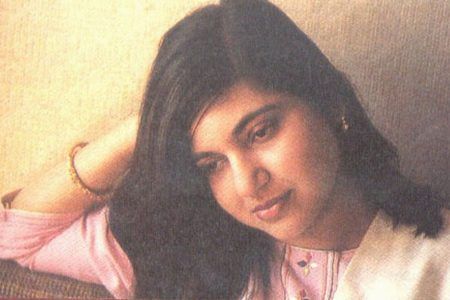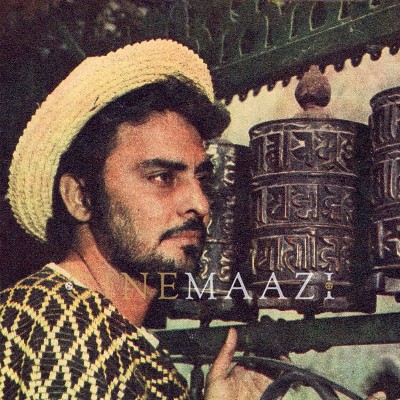Alka Yagnik

Subscribe to read full article
This section is for paid subscribers only. Our subscription is only $37/- for one full year.
You get unlimited access to all paid section and features on the website with this subscription.
Not ready for a full subscription?
You can access this article for $2 , and have it saved to your account for one year.
- Born: 20 March, 1966 (Calcutta, West Bengal)
- Primary Cinema: Hindi
- Parents: Shubha Yagnik, Dharmendra Shankar
- Spouse: Neeraj Kapoor
- Children: Syesha Kapoor
Among Hindi cinema’s most illustrious singers, Alka Yagnik’s dulcet, pure voice has charmed listeners over the decades. She has been alluded to by critics as the ‘honey-voiced singer’, the one with the ‘magical voice’, and even the ‘Queen of Playback Singing’. She has rendered playback for over 1000 Indian films, singing more than 8,000 songs in various Indian languages including Hindi, Assamese, Bengali, Gujarati, Malayalam, Marathi, Punjabi, Tamil and Telugu, in the course of a career spanning more than four decades. Whether romantic, sad, peppy, seductive or item numbers, Yagnik has effectively crooned across all genres. While she has rendered the maximum number of female solos, she is also currently the record-holder along with Asha Bhosle for the highest number of Filmfare awards won—namely, 7 out of a whopping 36 nominations. This is in addition to numerous other awards, including two National Awards, for her songs Ghoongat ki aad se from Hum Hain Rahi Pyar Ke (1993), and Kuch kuch hota hai from Kuch Kuch Hota Hai (1998). If additional testimony to her popularity were needed, 20 of her songs feature in BBC’s list of top 40 Hindi film soundtracks of all time. Entering the industry in the 80s, at a time when the legendary Lata Mangeshkar and Asha Bhosle still held sway, she created a niche for herself, and is said to have recorded an average of five songs a day in her heyday. She continues to render playback and is a big draw at concerts across the world.
Alka Yagnik was born in Calcutta on 20 March 1966 into a Gujarati family to father Dharmendra Shankar and Indian classical music singer mother Shubha, who was her first teacher. Alka was just six when, in 1972, she started singing bhajans for Akashvani (All India Radio), Calcutta. Aged 10, she was accompanied to Bombay by her mother, who was determined to see her talent shine as a child singer. However, despite being impressed by her voice, music directors Kalyanji Veerji Shah and Anandji Veerji Shah as well as music composer Laxmikant Shantaram Kudalkar of Laxmikant-Pyarelal fame, advised her to wait till her voice matured to become a full-fledged singer.
Alka went on to make her playback singing debut in the Rajshri film Payal Ki Jhankaar (1980). Her song Mere angane mein from Laawaris (1981) was followed by her first full-fledged song Hum tum rahenge for Rajesh Roshan in Hamari Bahu Alka (1982). However, she can be said to have truly hit the highs only with Ek do teen from the superhit Tezaab (1988). The song, a chart-busting success, counting the days of the month till the character meets her lover, became a rage, enacted by Madhuri Dixit onscreen. It also won Yagnik the first of her seven Filmfare Awards for Best Female Playback Singer.
She went on to become the voice of many younger-generation heroines, including Kajol and Preity Zinta. Through the 90s, she along with Kavita Krishnamurthy and Poornima, rendered playback for most of the leading ladies. She rendered duets with leading male singers of her time, singing mainly romantic songs with Kumar Sanu, and more flamboyant songs with Udit Narayan, and Sonu Nigam. Along with Sanu and Narayan, she was part of the 90s triumvirate of playback singing.
Yagnik won numerous awards for her songs. She picked up additional Filmfare Awards for Choli ke peeche (shared with Ila Arun) for Khalnayak (1993), Meri mehbooba from Pardes (1997), Taal se taal from Taal (1999), Dil ne yeh kaha hai dil se from Dhadkan (2000), O re chhori from Lagaan (2001), and Hum tum from Hum Tum (2004). Some of her best songs include Gazab ka hai din from Qayamat Se Qayamat Tak (1988), Dekha hai pehli baar from Saajan (1991), Aisi deewangi from Deewana (1992), Chura ke dil mera from Main Khiladi Tu Anari (1994), Tip tip barsa paani from Mohra (1994), Raja ko rani se from Akele Hum Akele Tum (1995), Thodasa pyar hua hai from Maine Dil Tujhko Diya (2002), Tauba tumhare ishare from Chalte Chalte (2003), Tumse milna from Tere Naam (2003), and Agar tum saath ho from Tamasha (2015).
Controversy came calling with the suggestive song Choli ke peeche, penned by Anand Bakshi, which Yagnik rendered for Khal Nayak. The song was deemed obscene, and even banned on Doordarshan and All India Radio, besides facing legal challenge at the Central Board of Film Certification. Needless to add, it was a resounding hit. She rendered another controversial song, Din mein leti hai from Amanaat (1994) with Kumar Sanu and Ila Arun.
In a career studded with musical hits, Alka Yagnik has worked with leading music directors such as Laxmikant-Pyarelal in films like Coolie (1983), Tezaab, Hum (1991), Khalnayak and Khuda Gawah (1992). She collaborated with Nadeem-Shravan in hit films like Saajan, Deewana, Hum Hain Rahi Pyar Ke (1993), Raja Hindustani (1996), Pardes (1997), Dhadkan, Kasoor (2001), Raaz (2002) and Andaaz (2003). With Jatin-Lalit she worked in hits such as Raju Ban Gaya Gentleman (1992), Khamoshi: The Musical (1996), Yes Boss (1997), Kuch Kuch Hota Hai (1998), Sarfarosh (1999), Phir Bhi Dil Hai Hindustani (2000), Kabhi Khushi Kabhie Gham (2001), Chalte Chalte, and Hum Tum (2004). She was part of Anu Malik’s hits in films like Baazigar, Phir Teri Kahani Yaad Aayee (1993), Vijaypath (1994), Main Khiladi Tu Anari (1994), Akele Hum Akele Tum, Refugee (2000), Fiza (2000) and Yaadein (2001). She also collaborated with A R Rahman in films such as Taal (1999), Lagaan, Zubeidaa (2001), Swades (2004), Yuvvraaj (2008), Slumdog Millionaire (2008) and Tamasha. With Rajesh Roshan she rendered beautiful melodies in Kaamchor (1982), Karan Arjun (1995), Papa Kehte Hai (1996), Kaho Naa... Pyaar Hai (2000) and Koi... Mil Gaya (2003). She worked with Anand Milind in well-appreciated films such as Qayamat Se Qayamat Tak, Laadla (1994), Coolie No.1 (1995), Hero No. 1 (1997) and Mrityudand (1997). While she collaborated with Himesh Reshammiya in Humraaz (2002), Tere Naam (2003) and Aitraaz (2004), she worked with Shankar–Ehsaan–Loy in films such as Mission Kashmir (2000), Dil Chahta Hai (2001), Kal Ho Naa Ho (2003), Lakshya (2004) and Kabhi Alvida Naa Kehna (2006).
Besides film music, she has released private albums such as Tum Yaad Aaye in 1997 with Javed Akhtar and Raju Singh, Tum Aaye in 2002 with Javed Akhtar and Hariharan, and Shairana in 2003 with Javed Akhtar and Shankar Mahadevan. In 2012 she and Sonu Nigam sang a song Shiksha ka suraj as part of the National Literacy Mission of India; together they also sang Phool khil jayenge for child health awareness. Yagnik has also performed the Hanuman Chalisa and other devotional songs. At the other end of the spectrum, her song Chamma Chamma from China Gate (1998) featured in the song Hindi Sad Diamonds from the soundtrack of the Hollywood film Moulin Rouge (2001).
On the personal front, she is married to Shillong-based businessman Neeraj Kapoor since 1989. The couple has a daughter named Syesha Kapoor.
References
Image courtesy: Odisha Bytes, Dainik Bhaskar










.jpg)



